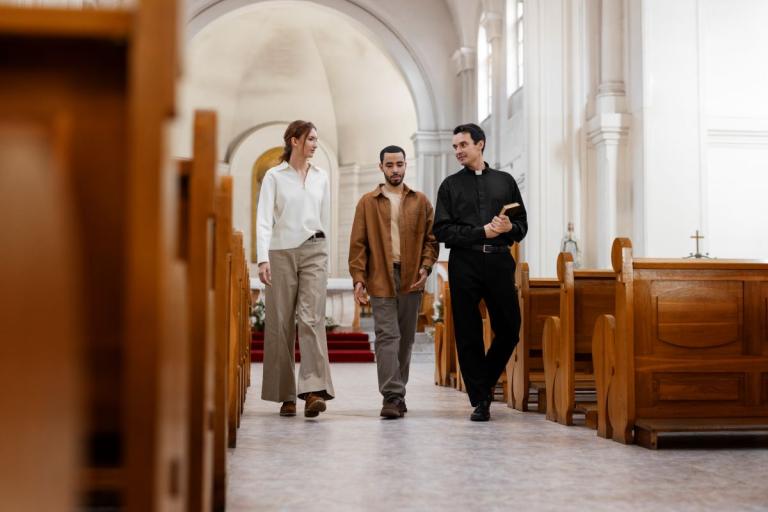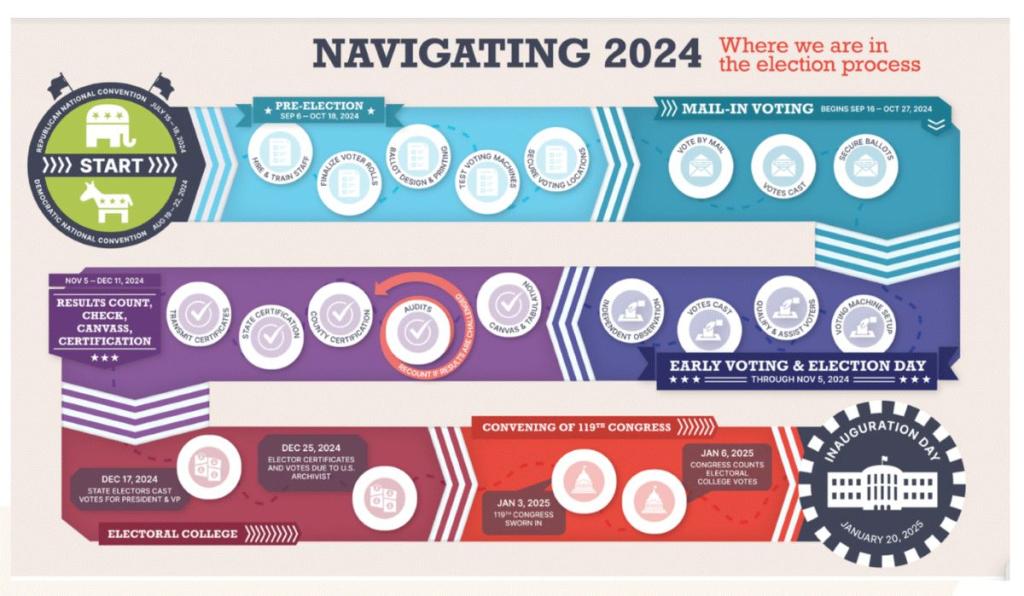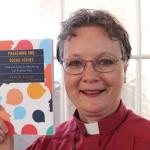The Sundays after an election in the U.S. are often fraught for clergy and congregations. 2024 is likely to be even more contentious. So how can ministers talk with their congregations after the election? Here are 4 post-election messages that include practical, biblical, theological, and ethical advice.
[This article has been updated in light of the results of the 2024 election.]

With emotions running high, many are turning to their faith communities for guidance, reassurance, and a path forward.
After the election and beyond, the role of clergy and churches is especially important. Ministers have the opportunity – and obligation – to offer ethical and moral leadership to their congregations and communities in the post-election season.
I recently sat down Rev. Breanna Illéné of the Wisconsin Council of Churches to discuss how clergy can help their congregations navigate this time of uncertainty and division. [Watch “Navigating the Election Season in Your Congregation.”] With heightened tensions, how do we respond with faith-centered messages that offer peace and hope?
Embracing faith amid uncertainty
In today’s highly-charged political climate, churches often find themselves navigating complex discussions at the heart of public concerns. While it might feel simpler to avoid election topics, silence can imply that our faith has little to say about crucial issues impacting families, communities, and society.
If we don’t want to inadvertently communicate through our silence that the church does not care about social issues, we need to find ways to say something about this election, because it will have a huge impact on the people we serve. So, if there was ever a time for clergy to speak openly about an election in a way that reflects Christianity’s core values, this is it.
Educating congregations about the election process
One way to dispel anxiety and restore confidence is to clarify the election process. Churches and clergy can serve as trusted messengers about what happens with vote counting and certification during the “interregnum,” the period between the election and inauguration. This can include educating congregants about where we are in the process, what has happened so far, and what is happening next.
This “map” created by Chris Crawford at Protect Democracy can be a useful resource.

Information like this can be especially helpful if we see certain individuals or factions attempting to interrupt, delay, or disrupt this long-established and respected process. Understanding what is supposed to happen in a well-functioning post-election process helps us identify bad-faith actors and actions intending to dislocate the peaceful transfer of power in our democracy.
So, one of the most important points to convey is that there are many levels of checks and balances in the process to ensure that the elections are fair, honest, and correct.
And for clergy, it is vital to bring scripture, theology, and ethics to bear on the post-election season.
4 post-election messages for ministers to emphasize
During the post-election season, pastors can embody a non-anxious presence by staying grounded in biblical, theological, and ethical principles. As some will try to create or exacerbate conflict over the results of the election, moral messaging is a must.
Clergy need to be ethically centered, steady, composed, and resolved, during this time. This means concentrating on foundational principles such as honesty, integrity, nonviolence, compassion, and caring for the most vulnerable.
Here are four post-election messages to emphasize.
1 – Every person matters to God. So be a good neighbor.
Some people are angry, worried, and even despondent about the results of the election. Others are celebrating. It’s important that we listen deeply to the fears – and hopes – of those who are reacting to this election.
Why is this important from a biblical persepctive?
Because Genesis 1:26-27 tells us that every person is created in God’s image. This means that each individual has inherent dignity and value.
This also means that we must treat each person with respect, stand alongside and defend those who are being targeted or bullied, and comfort those who are hurting.
2 – God wants us and others to be safe.
The sad reality is that some people have disrupted the democratic process through intimidation, aggressive rhetoric, destruction of voting boxes, and physical threats. Keeping people from voting has been a key factor in this election, and it has been for centuries.
Right now, many people in our country disagree with each other about what should be happening in our country. Because our nation is deeply divided, intimidation and threats of violence are ongoing. This could escalate at any time, and it can be frightening.
Why is this important from a theological perspective?
We want to be clear that God wants everyone to be safe after the election and at all times. God wants people to tell the truth, solve their differences peacefully, and protect the vulnerable.
In Mark 12:31, Jesus says we need to love our neighbors. As a church, this should be our message as well. So, when encourage non-violence even as people express anger, we are doing our part to help keep people safe. Christians must follow Jesus’s command to show compassion and reject all forms of political violence.
3 – Our words matter to God.
During this election, some leaders have said mean, hurtful things. Words have been used to insult and bully certain individuals and groups as well as incite violence. Because of this, we as Christians need to be especially aware of what we say.
We need to ask ourselves important questions.
What is the impact of our words? How do we make sure we are speaking truth? How do we ensure we aren’t repeating rumors or lies? And how do we make sure our words are always loving?
Why is this important from a biblical perspective?
One of God’s commandments in Exodus 20:16 tells us not to use our words in dishonest and hurtful ways.
Proverbs 18:21 tells us that what people say has the power of life and death.
James 3:5-6 says that even though the tongue is a small part of the body, it’s like a tiny spark that can set a whole forest on fire.
Ephesians 4:29 tells us to only say things that are helpful and build others up. This applies even to those with whom we disagree we politically.
All of this is to say that we need to use our words constructively, both in the church and out in the world. If we represent Christ, then our words and actions need to reflect what Jesus taught us.
4 – Even though the election season brought out the worst in some people, it also brought out the best in others.
During the election season, people came together to encourage each other while voting. This includes pastors and congregations who supported the democratic process in many ways.
Some organized get-out-the-vote drives. Others provided space for voting. Still others handed out water and snacks in long lines. Also, some clergy were a calming presence serving as poll chaplains.
Why is this important from a biblical perspective?
These are examples of bearing the fruits of the Spirit, like kindness and faithfulness (Galatians 5:22-23). It also shows that people of faith are courageous in standing up for their beliefs, as Paul encouraged in 1 Corinthians 16:13-14. In the post-election season, we can continue to be part of God’s kindness, reaching out to those in need.
Now that we’ve covered these broad messages, here are three additional things to keep in mind when talking to your congregation in this post-election season.
Be cautious about “unity” language.
As much as we desire for there to be unity in our congregations and communities, be cautious about insisting people “come together” when some may not feel safe or when they are actually under threat or attack.
There are people living with the effects of harmful and violent political rhetoric and policies undergirded by transphobia, misogyny, anti-Semitism, Islamophobia, fear of immigrants, violence, racism, and white privilege. And the incoming administration has made plans to put policies in place that reflect these beliefs. So, encouraging people to come together with those who have supported harmful policies would be insensitive at best, harmful at worst.
Think about the people who have expressed fear or distress, regardless of their political position. Reach out and check in with people. But avoid urging them to engage with those who they feel may be threatening or harmful to them. Instead, offer space for people to share their feelings in a holy conversation.
Remember that liturgy is God’s holding space for us.
We are not the first people to experience political division or polarization. In the church, we have the advantage of rituals—ancient words and actions that have held the feelings and experiences of those before us. Encourage your congregation to embrace the rhythms of worship as God’s holding space for us.

Whether through hearing God’s word, breaking bread, singing hymns, or lighting candles, these actions offer peace and remind us that God’s Spirit is with us, even in overwhelming times.
Finally, remember that the work of the church is ongoing, regardless of the election’s outcome.
God is still at work in the world, despite our political divides. Those who are poor, hurting, and ignored will still need the church’s attention, no matter who wins.
We must remind our congregations, and our selves, that just as Jesus continued his ministry, teaching, feeding, and healing, regardless of who was in power, so must we.
Elections come and go, but the work of God’s Church remains.

Know that you are not alone in this post-election season. If you are clergy looking for a network of progressive pastors to help navigate this divisive time, check out the Clergy Emergency League website for more resources, including Bible studies, webinars, and colleague check-ins.
Read also:
Clergy: Prepare for Post-Election Season in Mind, Body & Spirit
Fill Your Lamps, Church – Let’s Be Ready! Post-election Sermon
Post-Election Messaging & Preaching: Red, Blue & Purple Church Tactics

The Rev. Dr. Leah D. Schade is the Associate Professor of Preaching and Worship at Lexington Theological Seminary in Kentucky and ordained in the ELCA. Dr. Schade does not speak for LTS or the ELCA; her opinions are her own. She is the author of Preaching and Social Issues: Tools and Tactics for Empowering Your Prophetic Voice (Rowman & Littlefield, 2024), Preaching in the Purple Zone: Ministry in the Red-Blue Divide (Rowman & Littlefield, 2019) and Creation-Crisis Preaching: Ecology, Theology, and the Pulpit (Chalice Press, 2015). She is the co-editor of Rooted and Rising: Voices of Courage in a Time of Climate Crisis (Rowman & Littlefield, 2019). Her book, Introduction to Preaching: Scripture, Theology, and Sermon Preparation, was co-authored with Jerry L. Sumney and Emily Askew (Rowman & Littlefield, 2023).













